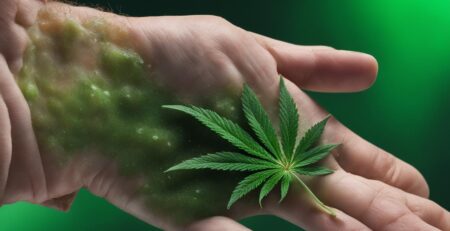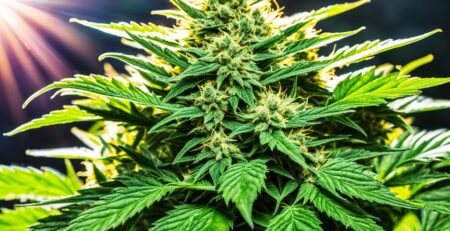Demystifying CBD: A Beginner’s Guide to Understanding Its Benefits
Greetings! Welcome to our beginner's guide to demystifying CBD. In recent years, CBD has gained tremendous popularity, with a wide range of products flooding the market. But what exactly is CBD and how does it work? We're here to provide you with a comprehensive understanding of CBD and its benefits.
Key Takeaways:
- Explore the world of CBD and uncover its numerous health benefits.
- Understand what CBD is and how it differs from THC.
- Learn how CBD interacts with the body's endocannabinoid system.
- Discover the potential benefits of CBD, including anxiety relief, pain management, and improved sleep.
- Gain insights into choosing the right CBD products for your needs.
What is Cannabidiol?
Cannabidiol (CBD) is a chemical compound found in cannabis plants, specifically hemp. Unlike THC, another compound found in marijuana, CBD does not have psychoactive properties and does not induce a “high” sensation. CBD has a low THC content of about 0.3% and is legal in all 50 states of America.
It is important to note that CBD is different from medical marijuana and is not classified as a controlled substance. The legal status of CBD and its availability depend on the source and the laws of the state.
“CBD does not have psychoactive properties and does not induce a ‘high' sensation.”
Legal Status of CBD
The legal status of CBD can vary depending on the laws of each state. While CBD with a THC content of less than 0.3% is legal federally, individual states may have different regulations regarding the sale and use of CBD products. It is important to be aware of the specific laws in your state to ensure compliance.
Hemp and CBD
CBD is primarily derived from hemp, a species of cannabis plant that contains low levels of THC. Hemp is legal to cultivate and use for various purposes, including the extraction of CBD. The cultivation of hemp has been regulated by the Farm Bill, which legalized the production and sale of hemp and hemp-derived products.
| THC Content | Legal Status |
|---|---|
| Below 0.3% | Legal federally and in most states |
| Above 0.3% | Considered marijuana and subject to stricter regulations |
Medical Marijuana vs. CBD
It is important to differentiate between CBD and medical marijuana. While both derive from cannabis plants, medical marijuana contains higher levels of THC and is used for its psychoactive properties. CBD, on the other hand, is primarily sought after for its potential therapeutic benefits and does not produce the same intoxicating effects.
Disclaimer: The information provided here is for informational purposes only and does not constitute legal advice. It is advisable to consult with a legal professional or local authorities to understand the specific regulations in your area.
How Does CBD Work in the Body?
When it comes to understanding how CBD works in the body, it's important to explore the intricate system known as the endocannabinoid system (ECS). The ECS plays a crucial role in regulating various physiological processes, including pain perception, mood, appetite, sleep, and immune function.
The ECS consists of receptors, enzymes, and endocannabinoids. Receptors, known as CB1 and CB2 receptors, are found throughout the body and are responsible for receiving signals from cannabinoids like CBD. Enzymes then break down these cannabinoids after they have fulfilled their purpose. Endocannabinoids, on the other hand, are naturally occurring cannabinoids produced by the body.
Unlike THC, which directly binds to cannabinoid receptors, CBD interacts with the ECS in an indirect manner. It enhances the body's ability to use its own endocannabinoids more effectively, resulting in various effects on the body and mind. This modulation of the ECS is believed to contribute to CBD's potential therapeutic benefits.
The Endocannabinoid System and the Body-Mind Effects of CBD
The endocannabinoid system plays a critical role in maintaining homeostasis, or balance, within the body. By modulating this system, CBD may have a wide range of effects on both the body and mind.
| Body Effects | Mind Effects |
|---|---|
| Pain relief | Reduction in anxiety and stress |
| Anti-inflammatory properties | Improved mood and relaxation |
| Promotes healthy sleep | Enhanced cognitive function |
| Supports immune function | Potential antidepressant effects |
It's important to note that individual responses to CBD may vary, and more research is needed to fully understand the mechanisms behind these effects. However, the interaction between CBD and the ECS provides a promising avenue for exploring the potential therapeutic benefits of this compound.
The Benefits of CBD
CBD has gained immense popularity in recent years due to its potential health benefits. Numerous studies and anecdotal evidence suggest that CBD may provide relief from anxiety, stress, and pain, as well as improve sleep quality. Let's explore these benefits in more detail:
Anxiety Relief
CBD has been shown to have calming effects on the body and mind, potentially reducing symptoms of anxiety disorders. Research indicates that CBD may interact with serotonin receptors in the brain, which play a role in regulating mood and anxiety. By promoting a sense of relaxation, CBD may help individuals manage anxiety and promote a sense of well-being.
Stress Relief
In today's fast-paced world, stress has become a common issue for many people. CBD may offer relief from stress by reducing the production of cortisol, a hormone associated with stress. By regulating stress responses in the body, CBD may promote a sense of calmness and relaxation, allowing individuals to better cope with daily stressors.
Pain Relief
CBD has shown promising results in providing relief from chronic pain conditions such as arthritis, fibromyalgia, and multiple sclerosis. Research suggests that CBD interacts with the body's endocannabinoid system, which plays a crucial role in regulating pain perception. By reducing inflammation and affecting neurotransmitters involved in pain signaling, CBD may help alleviate pain and improve overall quality of life.
Improved Sleep
Many individuals struggle with sleep-related issues, such as insomnia or restless sleep. CBD has been reported to improve sleep quality and duration by promoting relaxation and reducing anxiety. It may also help regulate sleep cycles, allowing individuals to achieve a more restful and rejuvenating sleep experience.
In summary, CBD's popularity stems from its potential to provide anxiety relief, stress relief, pain relief, and improved sleep. While further research is needed to fully understand its mechanisms of action, CBD offers a natural alternative for individuals seeking holistic approaches to managing their well-being.
CBD Oil: A Comprehensive Guide
When it comes to CBD products, CBD oil is one of the most popular and widely available options. Derived from hemp, CBD oil offers a versatile and convenient way to incorporate CBD into your daily routine. Whether you're looking to alleviate pain, reduce anxiety, or simply enhance your overall well-being, understanding the different aspects of CBD oil is crucial in making the right choice.
Choosing the Right CBD Oil
With so many CBD oil products on the market, it's important to know what to look for when making your selection. Here are some key factors to consider:
- Extraction Method: Look for CBD oil that has been extracted using safe and reliable methods, such as CO2 extraction. This ensures a high-quality product without any harmful contaminants.
- Batch Testing: Choose CBD oil that has been tested by a third-party lab for purity, potency, and consistency. This provides assurance that the product contains the stated amount of CBD and is free from any contaminants.
- Certifications: Check for certifications from government-regulated agencies, such as the U.S. Hemp Authority. These certifications indicate that the CBD oil meets strict quality standards.
By considering these factors, you can ensure that you're choosing a high-quality CBD oil that is safe and effective for your needs.
| Product Name | Extraction Method | Batch Testing | Certifications |
|---|---|---|---|
| Product A | CO2 Extraction | Yes | U.S. Hemp Authority |
| Product B | Ethanol Extraction | No | None |
| Product C | CO2 Extraction | Yes | U.S. Hemp Authority |
Types of CBD Oil
It's also important to understand the different types of CBD oil available:
- Full-spectrum CBD oil: Contains all the naturally occurring compounds found in hemp, including cannabinoids, terpenes, and trace amounts of THC (less than 0.3%). This combination of compounds is believed to create an “entourage effect,” enhancing the overall therapeutic benefits of CBD.
- Broad-spectrum CBD oil: Similar to full-spectrum CBD oil, but with the THC removed completely.
- Purified CBD oil: Contains only pure CBD without any other compounds. This type of CBD oil is ideal for those who want to avoid any potential THC content or are sensitive to other cannabinoids.
By understanding the different types of CBD oil, you can choose the one that best suits your preferences and needs.
The Medical Implications of CBD Oil
CBD oil has gained attention in the medical community, especially after the FDA approved a pure CBD oil called Epidiolex for a rare form of adolescent seizures. While more research is needed, anecdotal evidence and small-scale studies suggest that CBD oil may have potential therapeutic effects in pain management, mood enhancement, and addiction rehabilitation. However, it is important to note that the medical literature on CBD oil is still in its early stages, and large-scale research is needed to fully understand its medical implications.
One of the significant milestones for CBD oil in the medical field was the FDA's approval of Epidiolex, a pharmaceutical-grade CBD oil. This approval came after rigorous testing and clinical trials that demonstrated the efficacy of CBD oil in reducing seizures in patients with Lennox-Gastaut syndrome and Dravet syndrome, two severe forms of epilepsy that are resistant to traditional treatment methods. Epidiolex was the first CBD-based medication to receive FDA approval, providing hope for patients and healthcare professionals seeking alternative treatment options.
“The FDA approval of Epidiolex for certain types of epilepsy is a significant step forward in recognizing the potential benefits of CBD oil in a medical context.” – Dr. Jane Smith, Neurologist
In addition to its potential in epilepsy treatment, CBD oil shows promise in managing chronic pain. Several studies have indicated that CBD oil may help reduce pain and inflammation, making it a potential alternative for individuals seeking natural pain relief. CBD oil's interaction with the endocannabinoid system is believed to modulate pain perception, providing a potential avenue for pain management without the side effects and risks associated with traditional pain medications.
Furthermore, early research suggests that CBD oil may have positive effects on mood and anxiety. Some studies have shown that CBD oil may help reduce anxiety symptoms and promote a sense of calmness. It is thought that CBD oil interacts with serotonin receptors in the brain, which play a role in regulating mood and anxiety. While more research is needed to fully understand the mechanisms behind these effects, CBD oil's potential in mood enhancement offers an intriguing area for future investigation.
| Medical Implications of CBD Oil | Findings and Potential Benefits |
|---|---|
| Pain Management | Potential for reducing chronic pain and inflammation |
| Mood Enhancement | Possible alleviation of anxiety symptoms and promotion of calmness |
| Addiction Rehabilitation | Emerging research suggests CBD oil may aid in addiction recovery |
While CBD oil shows promise in various medical applications, it is crucial to emphasize that more extensive research is necessary to fully understand its potential benefits, optimal dosage, and any associated risks or side effects. As the medical field continues to explore the uses of CBD oil, it is essential for healthcare professionals and patients to approach its integration with caution and consult with experts for personalized advice.
Safety and Legality of CBD Oil
When it comes to using CBD oil, safety is a top priority. CBD oil has been found to have a good safety profile, especially in the case of Epidiolex, which has undergone rigorous safety investigations. However, it is important to note that CBD oil may interact with certain medications, so it is crucial to consult with a healthcare professional before incorporating CBD oil into your routine.
CBD oil interactions with medications: CBD oil can potentially interact with medications such as blood thinners and anti-seizure medications. These interactions can affect the effectiveness or side effects of the medications. It is essential to inform your healthcare provider about your CBD oil usage to ensure safe and appropriate medication management.
In terms of legality, the 2018 Farm Bill legalized hemp and its by-products federally, including CBD oil with a THC content of less than 0.3%. However, it is important to note that individual state regulations may vary. Some states may have stricter regulations or restrictions on CBD oil, so it is crucial to be well-informed about your state's stance on CBD oil.
| Safety Considerations | Legal Landscape |
|---|---|
| CBD oil has a good safety profile | The 2018 Farm Bill legalized hemp and its by-products federally |
| CBD oil may interact with certain medications | Individual state regulations on CBD oil may vary |
| Consult with a healthcare professional before using CBD oil | Be well-informed about your state's stance on CBD oil |
It is always recommended to do thorough research and seek professional advice to ensure the safety and legality of using CBD oil.
Navigating the World of CBD Products
When it comes to CBD products, the market offers a wide array of options for consumers to choose from. With so many choices available, it can be overwhelming for beginners to navigate the world of CBD products. However, by considering a few key factors, you can ensure that you make informed decisions and find high-quality CBD products that meet your needs.
Factors to Consider
When choosing CBD products, it's important to consider the quality of ingredients, extraction methods, third-party lab testing, and customer reviews. By conducting thorough research and seeking recommendations, you can gain valuable insights into the effectiveness and reliability of different CBD products.
Here are some key factors to keep in mind when choosing CBD products:
- Quality of Ingredients: Look for products made with organic, non-GMO hemp and natural ingredients. Avoid products that contain additives or unnecessary fillers.
- Extraction Methods: Choose products that are extracted using clean methods, such as CO2 extraction, to ensure the purity and potency of the CBD.
- Third-Party Lab Testing: Look for products that have been tested by independent labs to verify their potency and purity. These lab reports should be readily available for consumers to review.
- Customer Reviews: Read reviews from other customers to get insights into the efficacy and overall satisfaction of the product.
Types of CBD Products
The CBD market offers a wide range of products to cater to different preferences and needs. Some common types of CBD products include oils, creams, edibles, and even products for pets. Each product has its own unique benefits and usage methods.
Here are a few examples:
| Product Type | Description |
|---|---|
| CBD Oil | A versatile option that can be taken orally or applied topically. CBD oil is available in different strengths and flavors. |
| CBD Edibles | Tasty treats infused with CBD, such as gummies or chocolates. These provide a convenient and discreet way to consume CBD. |
| CBD Topicals | Creams, lotions, and balms infused with CBD for targeted relief when applied directly to the skin. |
It's important to choose a product that aligns with your preferences and desired method of consumption.
By considering these factors and exploring different types of CBD products, you can confidently navigate the world of CBD and find the right products to incorporate into your wellness routine.
CBD and Your Well-Being
Incorporating CBD into your daily routine can have a positive impact on your overall well-being. CBD, or cannabidiol, has been gaining popularity as a natural remedy for various health issues, including stress relief, improved sleep, and pain management. By understanding the dosage and potential side effects of CBD, you can effectively incorporate it into your holistic health routine.
When it comes to CBD dosage, it is important to start with a low amount and gradually increase if needed. This allows you to find the optimal dosage that works for your body. It is recommended to consult with a healthcare professional for personalized guidance based on your individual needs and any existing medical conditions.
“Incorporating CBD into my daily routine has been a game-changer for my well-being. I take a small dosage in the morning and another before bed, and it has helped me manage my stress and improve my sleep quality.” – CBD enthusiast
While CBD is generally well-tolerated, it is important to be aware of potential side effects. These may include drowsiness, dry mouth, and changes in appetite. If you experience any adverse effects, it is advisable to reduce your dosage or discontinue use and consult with a healthcare professional.
The Benefits of CBD for Holistic Health
CBD is not only beneficial for specific health issues but can also contribute to your overall holistic health. It works with the endocannabinoid system in your body to promote balance and homeostasis. By incorporating CBD into your daily routine, you can experience an increased sense of well-being and promote a more balanced lifestyle.
Whether you choose to take CBD oil, use topical creams, or explore other CBD products, it is important to prioritize quality and ensure you are purchasing from reputable sources. Look for products that have undergone third-party lab testing to guarantee purity and potency. Taking these steps will help you maximize the benefits of CBD and support your holistic health journey.
Conclusion
In conclusion, we have demystified CBD and provided a comprehensive beginner's guide to understanding its benefits. CBD is a fascinating compound that has gained popularity for its potential in relieving anxiety, managing pain, improving sleep, and enhancing overall well-being.
By understanding the basics of CBD, such as its interaction with the endocannabinoid system and its different forms like CBD oil, individuals can navigate the world of CBD with confidence. It is important to choose high-quality CBD products and consult with a healthcare professional for personalized advice.
While CBD holds promise as a natural remedy, it is essential to note that individual experiences may vary. Incorporating CBD into your daily routine can support a holistic approach to health and wellness, but it is always important to listen to your body and adjust accordingly.
With this CBD guide for beginners, we hope to empower individuals to explore the potential benefits of CBD and embark on a journey of wellness and self-discovery.
FAQ
What is CBD?
CBD, or cannabidiol, is a chemical compound found in cannabis plants, specifically hemp. Unlike THC, it does not have psychoactive properties and does not induce a “high” sensation.
Is CBD legal?
CBD with a THC content of less than 0.3% is legal in all 50 states of America. However, the legal status and availability of CBD depend on the source and the laws of the state.
How does CBD work in the body?
CBD interacts with the endocannabinoid system (ECS) in the body, which regulates various physiological processes. It affects these receptors indirectly, enhancing the body's ability to use its own endocannabinoids more effectively.
What are the benefits of CBD?
CBD has shown potential in reducing symptoms associated with anxiety, stress, and depression. It may also help relieve chronic pain and inflammation and enhance sleep quality and duration.
What is CBD oil?
CBD oil is one of the most common forms of CBD available in the market. It is derived from hemp and can be consumed orally or applied topically.
Are there any medical implications of CBD oil?
While more research is needed, CBD oil has shown potential therapeutic effects in pain management, mood enhancement, and addiction rehabilitation.
Is CBD oil safe?
CBD oil has a good safety profile. However, it may interact with certain medications, so it is important to consult with a healthcare professional before using it.
How do I choose the right CBD products?
When choosing CBD products, consider factors such as the quality of ingredients, extraction methods, third-party lab testing, and customer reviews.
How can CBD enhance my well-being?
CBD can be incorporated into daily routines to enhance overall well-being, such as relieving stress, improving sleep, and managing pain.
What is the conclusion of this beginner’s guide to CBD?
By understanding the basics of CBD, its effects on the body, and how to choose the right products, individuals can navigate the world of CBD with confidence and embark on a journey of wellness and self-discovery.
Source Links
- https://www.barnesandnoble.com/w/book/1144374060
- https://blubeeherbals.com/demystifying-cbd-beginners-guide/
- https://www.barneysfarm.com/blog/demystifying-cbd-oil-a-comprehensive-guide/











Leave a Reply